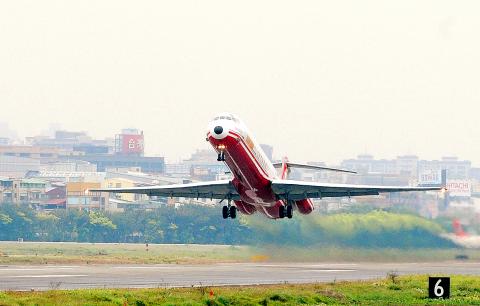Far Eastern Air Transport (FAT) resumed flight services yesterday after being grounded for two years because of financial problems.
The first flight leaving for Kinmen took off from Taipei International Airport (Songshan airport) at 9:30am.
FAT president Chang Kang-wei (張綱維) said at an inauguration ceremony that the airline would initially offer two daily flights between Taipei and Kaohsiung.

Photo: CNA
He said the company was planning to expand its flight services to Makong (馬公) and Kaohsiung and resume international flight services to Angkor Wat in Cambodia and to Palau.
Chang said the Civil Aeronautics Administration (CAA) was planning to re-arrange cross-straight flight services either next month or in June, and FAT would be able to reclaim the 15 cross-strait flights previously reserved for the company before its services were suspended.
Those 15 cross-strait flights are currently shared equally by five other carriers — China Airlines, EVA Air, Uni Air, Mandarin Airlines and TransAsia Airways.
“The day we launch cross-strait flight services is the day we become profitable,” Chang said.
The CAA suspended FAT’s operations in 2008 because of financial problems and the airline’s management has changed several times since then.
The company filed a financial restructuring plan with the Taipei District Court, which approved the company’s plan in 2009.
Chang said many had doubted that the company would be able to start operations again.
“The CAA used the highest standards to examine our plan to resume flights and we also demanded the highest standards of ourselves,” Chang said, adding that the company would undertake quality maintenance and provide new services.
Chang, a property developer who took over FAT in July 2009, said the airline was funded entirely by his personal investment.
He added that the number of the staff had also grown from 40 to 500 under his leadership.
The company owns 10 aircraft, three of which have passed the CAA’s air worthiness test.

A magnitude 4.9 earthquake struck off Tainan at 11:47am today, the Central Weather Administration (CWA) said. The hypocenter was 32.3km northeast of Tainan City Hall at a depth of 7.3km, CWA data showed. The intensity of the quake, which gauges the actual effect of a seismic event, measured 4 in Tainan and Chiayi County on Taiwan's seven-tier intensity scale, the data showed. The quake had an intensity of 3 in Chiayi City and County, and Yunlin County, while it was measured as 2 in Kaohsiung, Nantou County, Changhua County, Taitung County and offshore Penghu County, the data showed. There were no immediate reports of

‘DENIAL DEFENSE’: The US would increase its military presence with uncrewed ships, and submarines, while boosting defense in the Indo-Pacific, a Pete Hegseth memo said The US is reorienting its military strategy to focus primarily on deterring a potential Chinese invasion of Taiwan, a memo signed by US Secretary of Defense Pete Hegseth showed. The memo also called on Taiwan to increase its defense spending. The document, known as the “Interim National Defense Strategic Guidance,” was distributed this month and detailed the national defense plans of US President Donald Trump’s administration, an article in the Washington Post said on Saturday. It outlines how the US can prepare for a potential war with China and defend itself from threats in the “near abroad,” including Greenland and the Panama

The Chinese Nationalist Party (KMT) is maintaining close ties with Beijing, the Democratic Progressive Party (DPP) said yesterday, hours after a new round of Chinese military drills in the Taiwan Strait began. Political parties in a democracy have a responsibility to be loyal to the nation and defend its sovereignty, DPP spokesman Justin Wu (吳崢) told a news conference in Taipei. His comments came hours after Beijing announced via Chinese state media that the Chinese People’s Liberation Army’s Eastern Theater Command was holding large-scale drills simulating a multi-pronged attack on Taiwan. Contrary to the KMT’s claims that it is staunchly anti-communist, KMT Deputy

RESPONSE: The government would investigate incidents of Taiwanese entertainers in China promoting CCP propaganda online in contravention of the law, the source said Taiwanese entertainers living in China who are found to have contravened cross-strait regulations or collaborated with the Chinese Communist Party (CCP) could be subject to fines, a source said on Sunday. Several Taiwanese entertainers have posted on the social media platform Sina Weibo saying that Taiwan “must be returned” to China, and sharing news articles from Chinese state media. In response, the Mainland Affairs Council (MAC) has asked the Ministry of Culture to investigate whether the entertainers had contravened any laws, and asked for them to be questioned upon their return to Taiwan, an official familiar with the matter said. To curb repeated